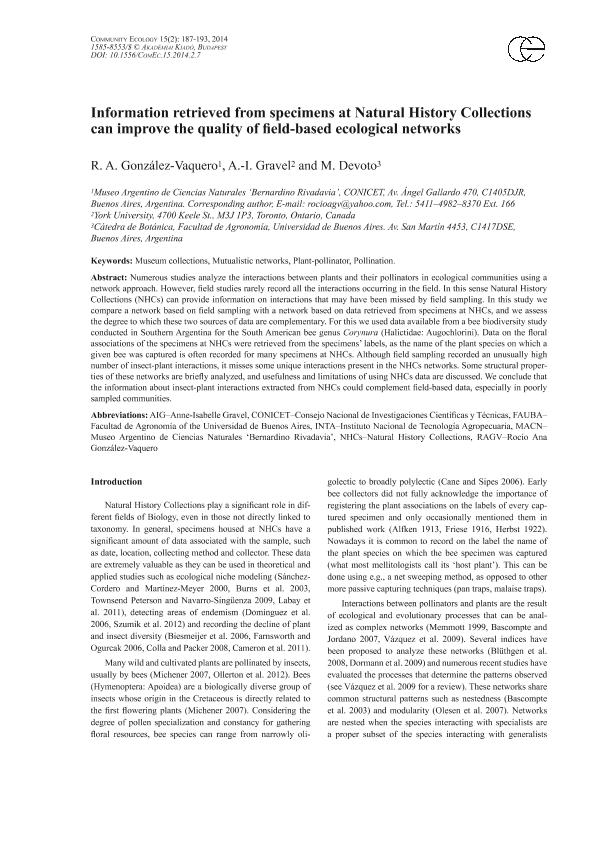Mostrar el registro sencillo del ítem
dc.contributor.author
González Vaquero, Rocío Ana

dc.contributor.author
Gravel, A. I.

dc.contributor.author
Devoto, Mariano

dc.date.available
2017-12-04T22:19:53Z
dc.date.issued
2014-11
dc.identifier.citation
González Vaquero, Rocío Ana; Gravel, A. I.; Devoto, Mariano; Information retrieved from specimens at Natural History Collections can improve the quality of field-based ecological networks; Akademiai Kiado Rt; Community Ecology; 15; 2; 11-2014; 187-193
dc.identifier.issn
1585-8553
dc.identifier.uri
http://hdl.handle.net/11336/29674
dc.description.abstract
Numerous studies analyze the interactions between plants and their pollinators in ecological communities using a network approach. However, field studies rarely record all the interactions occurring in the field. In this sense Natural History Collections (NHCs) can provide information on interactions that may have been missed by field sampling. In this study we compare a network based on field sampling with a network based on data retrieved from specimens at NHCs, and we assess the degree to which these two sources of data are complementary. For this we used data available from a bee biodiversity study conducted in Southern Argentina for the South American bee genus Corynura (Halictidae: Augochlorini). Data on the floral associations of the specimens at NHCs were retrieved from the specimens’ labels, as the name of the plant species on which a given bee was captured is often recorded for many specimens at NHCs. Although field sampling recorded an unusually high number of insect-plant interactions, it misses some unique interactions present in the NHCs networks. Some structural properties of these networks are briefly analyzed, and usefulness and limitations of using NHCs data are discussed. We conclude that the information about insect-plant interactions extracted from NHCs could complement field-based data, especially in poorly sampled communities.
dc.format
application/pdf
dc.language.iso
eng
dc.publisher
Akademiai Kiado Rt

dc.rights
info:eu-repo/semantics/openAccess
dc.rights.uri
https://creativecommons.org/licenses/by-nc-sa/2.5/ar/
dc.subject
Plant-Pollinator
dc.subject
Mutualistic Networks
dc.subject
Pollination
dc.subject
Museum Collections
dc.subject.classification
Otras Ciencias Biológicas

dc.subject.classification
Ciencias Biológicas

dc.subject.classification
CIENCIAS NATURALES Y EXACTAS

dc.title
Information retrieved from specimens at Natural History Collections can improve the quality of field-based ecological networks
dc.type
info:eu-repo/semantics/article
dc.type
info:ar-repo/semantics/artículo
dc.type
info:eu-repo/semantics/publishedVersion
dc.date.updated
2017-12-04T20:06:22Z
dc.journal.volume
15
dc.journal.number
2
dc.journal.pagination
187-193
dc.journal.pais
Hungría

dc.journal.ciudad
Budapest
dc.description.fil
Fil: González Vaquero, Rocío Ana. Consejo Nacional de Investigaciones Científicas y Técnicas. Oficina de Coordinación Administrativa Parque Centenario. Museo Argentino de Ciencias Naturales "Bernardino Rivadavia"; Argentina
dc.description.fil
Fil: Gravel, A. I.. York University; Canadá
dc.description.fil
Fil: Devoto, Mariano. Universidad de Buenos Aires. Facultad de Agronomía; Argentina. Consejo Nacional de Investigaciones Científicas y Técnicas; Argentina
dc.journal.title
Community Ecology

dc.relation.alternativeid
info:eu-repo/semantics/altIdentifier/doi/http://dx.doi.org/10.1556/ComEc.15.2014.2.7
dc.relation.alternativeid
info:eu-repo/semantics/altIdentifier/url/http://akademiai.com/doi/abs/10.1556/ComEc.15.2014.2.7
Archivos asociados
